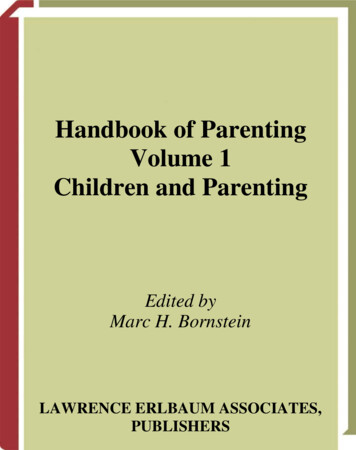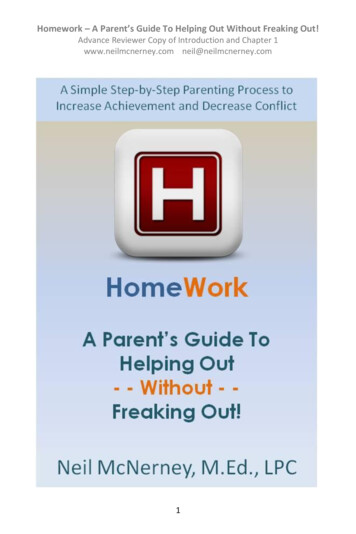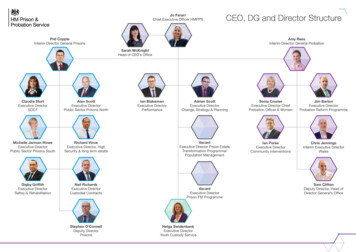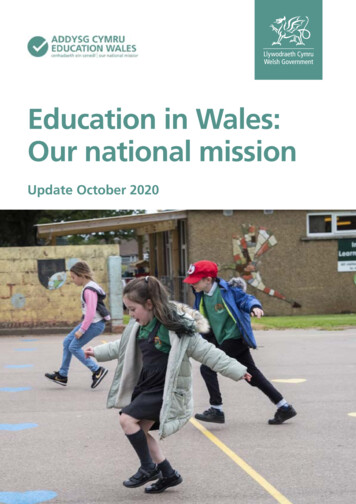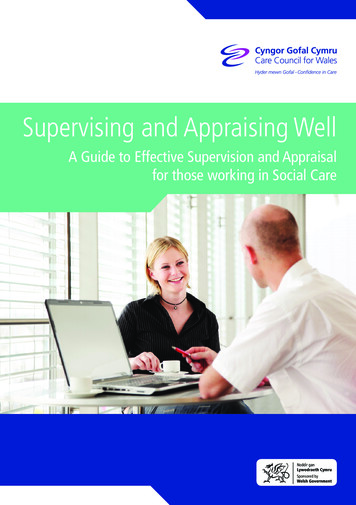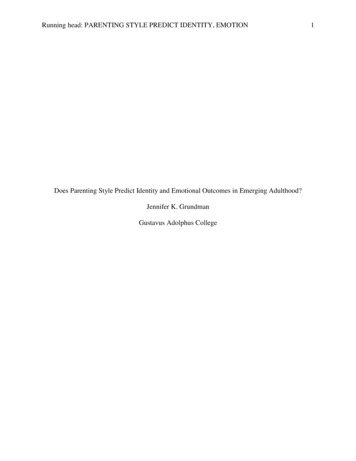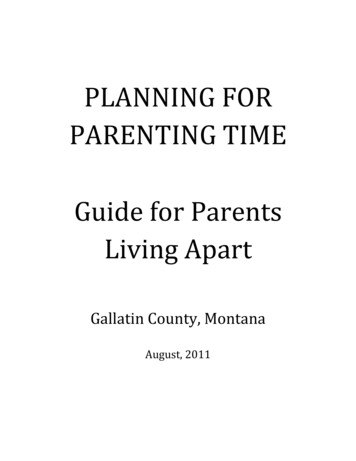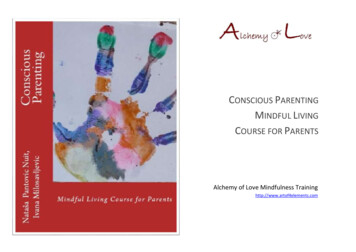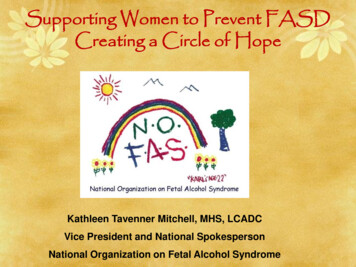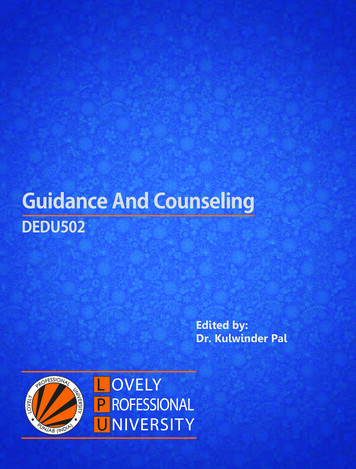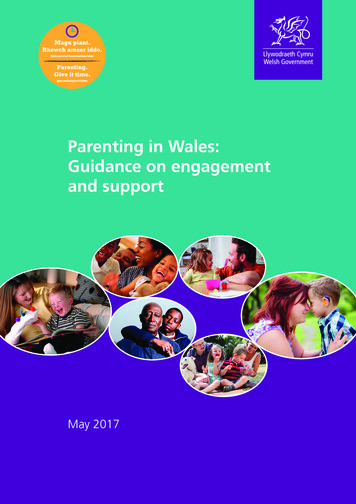
Transcription
Parenting in Wales:Guidance on engagementand supportMay 2017
Mae’r ddogfen yma hefyd ar gael yn Gymraeg.This document is also available in Welsh. Crown copyright 2017WG31979Digital ISBN 978 1 4734 9670 5
ContentsPageiAbout this Guidance2iiSummary51.Introduction72.Core Purpose93.Principles and Expectations104.Focus of Parenting Support165.Types of Support346.Designing and Delivering Parenting Support407.Parents with Specific Needs548.Workforce Development709.Evaluation and Monitoring7310.Supporting Documents and x A: NOS Principles and Values103Appendix B: Evidence-based Parenting Programmes105Appendix C: Tools to Measure Impact132Appendix D: One-to-One Support144Appendix E: Informal Structured Parenting Programmes147Appendix F: Informal drop-in support1611
iAbout this GuidanceParents play a central role in relation to outcomes for children. We know thatpositive outcomes for children are more likely when parents provide positiveguidance and care for their children based on the principles set out in theUnited Nations Convention on the Rights of the Child UNCRC. This guidanceis based on the core principles of the UNCRC which centres on respect forchildren’s best interests and rights, and support for parents in carrying outtheir role.The type of parenting support that meets parents’ needs will vary. Thediversity of family life means that a ‘one size fits all’ approach is unlikely to besuccessful. Parents need access to information, advice and support that ismatched to their need. A limited number of parenting classes, delivered over ashort space of time is not necessarily sufficient to meet the parenting needs ofall parents. In many cases a lot of effort will be needed to encourage andsupport the successful and sustained engagement of parents. The focus ofthis guidance is therefore, not only on ‘what’ parenting support to provide, butalso on ‘how’ practitioners engage with families.Parenting support needs to be available to all those who may play a key rolein bringing up children. Throughout this guidance the term ‘parent’ has beenused as a short hand to include mothers, fathers, foster carers, adoptiveparents, step-parents, ‘kinship’ parents and grandparents.It is important that parents have confidence in the quality of the parentinginterventions being delivered and the skills and integrity of those providingsupport. This guidance outlines the underpinning principles that should guideparenting support. This is about building and sustaining positive, respectfulrelationships with parents to enhance their parenting skills in supporting theirchild’s development, care and wellbeing. It includes working in partnershipwith parents to help them develop self-confidence in their parenting role. Italso includes working with parents in ways that help them relate positively totheir child. The guidance has been developed in line with the NationalOccupational Standards for Work with Parents NOS (see section 9).This guidance has been developed based on findings from the ‘Review ofparenting support for Flying Start’, which was commissioned by the WelshGovernment and undertaken by Interface Associates and York Consulting. Ithas also been informed by evidence gleaned from research reports andjournal articles. Some of this research relates to UK Government programmesand other practice in the UK and internationally, where we see they have arelevance to the delivery of parenting support in Wales.The guidance also provides a list of parenting programmes which areintended to support parents to develop positive parenting skills and strategies.Details of different programmes are outlined, which are designed to be usedwith parents with children of different ages or to address different needs. Alist of standardised ‘distance travelled’ tools is also provided which can beused to gauge whether parents are benefiting from the support they receive.2
A loose classification of approaches to supporting families (as set out in therainbow model below) suggests four typical areas: Universal - families with mostly no additional needs who are in receiptof universal services such as education and healthcare.Early intervention - families with some additional needs which can beaddressed through targeted early intervention supportIntensive support - families with multiple needs who require acoordinated multi-agency package of support to prevent needs fromescalating into crisisSpecialist services -families with acute, high-end needs requiringstatutory supportThis guidance is focused primarily on mainstream parenting support serviceswhich address parenting issues experienced by a substantial proportion ofparents in the universal early intervention segments.3
AudienceThe purpose of this non-statutory guidance is primarily to assist those whohave a direct or indirect role in, and responsibility for, providing parentingsupport. It is intended to support local authorities, Local Health Boards, ThirdSector and other relevant commissioners, managers and practitioners inmaking decisions about: the type(s) of parenting support to provide;how to provide it;approaches to supporting and engaging parents;workforce development;assessment processes, signposting and referral; andevaluation and monitoring.4
ii1.SummaryIntroductionThis section considers the case for providing parenting support. It identifiesthe impact that good parenting can have on promoting successful outcomesfor children.2.Core PurposeThis section sets out the core purpose of parenting support. The core purposeof parenting support is about working with parents to reduce risks;strengthen parenting capacity; develop and build resilience and sustainpositive change.3.Principles and ExpectationsThis section covers the principles that the Welsh Government expects shouldunderpin parenting support.4.Focus of Parenting SupportThis section provides an outline of the different themes of parenting supportthat should be offered.5.Types of SupportThis section looks at the different types of parenting support that can beoffered.6. Evidence-based, group-based structured parenting programmes One-to-one support Informal structured group-based parenting support Informal drop-in SupportDesigning and Delivering Parenting SupportThis section looks at different aspects of designing and delivering parentingsupport services:6.1 Assessment processes, signposting and referralThis section looks at assessment processes, signposting and referral.5
6.2 Costs and potential benefits of parenting programmesThis section explores the costs and benefits of delivering evidence-basedparenting programmes, which may help inform decisions aboutcommissioning and programme delivery6.3 Commissioners’ ChecklistThis section outlines what needs to be considered when designing orcommissioning parent support services6.2 Improving access and engagement in parenting programmesThis section provides information on barriers to engagement and tips andstrategies for overcoming them to increase parental engagement in parentingsupport.6.4 Participation of parents in parenting supportThis section explores the importance of giving parents an opportunity to:articulate what parenting support they need; provide feedback on the servicesthey receive; identify local issues and contribute suggestions for servicedevelopment.7.Parents with Specific NeedsThis section highlights some parents’ particular requirements and outlineswhat parenting support services may need to consider when adaptingservices to meet their needs. The groups of parents identified are not anexhaustive list and local areas will have identified groups of parents in theirarea who have specific needs that need to be accommodated.8.Workforce DevelopmentThis section focuses on workforce development. It also provides informationabout the National Occupational Standards for Work with Parents.9.Evaluation and MonitoringThis section provides information on monitoring and evaluating parentinginterventions, as an important aspect of measuring service quality; assessingwhether services are working effectively; and gauging whether parents arebenefiting from the support they receive.10. Supporting Documents and ContactsThis section provides sources of additional information and resources.11. DefinitionsThis section provides definitions for some of the key terms used throughoutthe guidance6
1. IntroductionThe Welsh Government recognises the importance of providing good qualityparenting support because there is plenty of evidence that good parenting isthe key to successful outcomes for children.Childhood experiences, both positive and negative, have an impact on thehealth and well-being of children. Stressful or traumatic experiences thatoccur during childhood (Adverse Childhood Experiences (ACEs)) may causetoxic stress during childhood, which can cause problems both early on andthroughout life. ACEs may include child maltreatment, parental separation,parental incarceration, drug use, mental illness and domestic abuse.When children are exposed to many ACEs they may be overloaded withstress hormones. Some stress is normal and can be beneficial but too muchcan cause problems. For example, suffering four or more ACEs in childhoodincreases the chances of high-risk drinking in adulthood by four times, being asmoker by six times and reporting being involved in violence in the last yearby around 14 times. Adverse experiences do not necessarily dictate a childwill have poor outcomes although the more ACEs a child is exposed to, thehigher their risk of developing problems (Public Health Wales 2015).Protective factors also have the potential to promote resilience in children whoexperience ACEs or minimise their impact.Whilst defining such issues as ACES is a more recent development, researchand support programmes have often highlighted the factors which will putchildren at risk of poor outcomes or protect them (Barrett, 2003). Risk factorsrelating to parenting include parents’ family upbringing, low parentalsupervision, harsh and inconsistent parental discipline; chronic family discord,conflict/violence; divorce/separation of parents; father absence; re-marriageand entry of step-parent. Protective factors include a good relationship withone parent; a lot of attention paid to the infant in the first year; positive parentchild relationships; wider network of social support; and structure and rules inthe household. Some of these protective factors can be developed and therisk factors lessened with comprehensive parenting support.Family environments which include factors associated with good parentinghave been shown to be a protective feature for children growing up indisadvantaged neighbourhoods (Seaman et al, 2005; Katz and Redmond,2009; Nixon, 2012). Sensitive, available and consistent parenting has beenshown to promote resilience in children living in poverty (Sroufe, et al 1990;Nixon, 2012). Good quality relationships between mothers, fathers and theirchildren are also associated with positive outcomes, which appear to carryover to adulthood (O’Connor and Scott 2007). Research also suggests thatthe strongest influences on self-esteem are an individual’s parents (Emler,2001).There is also a considerable body of evidence showing that parentalengagement and 'at-home good parenting' has a positive impact on a child’s7
learning and outcomes at school, mediating the negative consequences oflow income (Desforges and Bouchaard, 2003; Feinstein and Sabates, 2006).“.parental involvement in the form of ‘at-home good parenting’ has asignificant positive effect on children’s achievement and adjustment evenafter all other factors shaping attainment have been taken out of theequation. The scale of the impact is evident across all social classesand all ethnic groups” (Desforges and Bouchaard 2003).The Sutton Trust, who campaign to improve social mobility, have alsoidentified secure attachment, positive parenting and the home environment askey factors in promoting educational success (Moullin et al, 2008).The University College London Institute of Health Equity was commissionedby 4Children to identify the most important outcomes Children’s Centresshould be focussing their efforts to give all children positive early-yearsexperiences. In their recommendations they stated that parenting should beplaced on an equal footing with influencing children directly (Bowers andStrelitz, 2012).Research also shows that parenting support can benefit families; (Moran et al2004; Allen, 2011) that some structured evidence-based parentingprogrammes (delivered by appropriately trained and supervised practitioners)can benefit young children with emotional and behavioural problems and canincrease parents’ confidence, satisfaction and improve well-being (Barrett,2003, Bywater et al, 2009, Barrett, 2010). They have also shown beneficialoutcomes with parents from disadvantaged communities (Hutchings et al,2007) and with parents from minority ethnic backgrounds (Scott et al, 2006).8
2. Core PurposeThe core purpose of parenting support is about working with parents toreduce risks; strengthen parenting capacity; develop and build resilience andsustain positive change in the best interests of children.Keeping a strong focus on positive outcomes intended for children1 andreflecting their rights, support for mothers, fathers and carers should beprovided that will: enhance positive parenting skills to manage behaviour more effectivelyand promote children’s social skills, self-esteem and self-discipline;improve parent–child relationships and parent-parent relationships;develop positive attitudes, aspiration and resilience;strengthen parents’ understanding of child development and foster theirability to be more responsive to the needs of their children to promotetheir social, emotional and cognitive development and well-being;increase parents’ confidence in their parenting role; andincrease parents’ confidence and skills in providing a positive homelearning environment and supporting their child with their learning.Parenting support should be responsive to parents’ needs and shouldincorporate open access and universally available services, through to morestructured and targeted support. It should always be delivered using astrengths based approach.A range of options should be provided for parents depending on theirindividual assessed needs and circumstances. This could be one-to-onesupport, informal groups, or a formal evidence-based parenting programme. Itis important that any support offered has clear aims and objectives and thatthe intervention is likely to meet the family’s needs and goals.1A child refers to any child or young person under the age of 18.9
3. Principles and ExpectationsThis section covers the principles that the Welsh Government expects shouldunderpin the delivery of parenting support.3.1 Commitment to the principles of the UNCRCAll support for parents should reflect the rights of the child set outin the UNCRC.The Welsh Government is committed to the United Nations Convention on theRights of the Child UNCRC2 as a basis for its policy with children and youngpeople, as encapsulated in the Rights of Children and Young Persons (Wales)Measure 2011.3 The UNCRC is an international agreement that promotes thehuman rights of children under the age of 18.The preamble to the Convention states that children “should grow up in afamily environment, in an atmosphere of happiness, love and understanding”.All support for parents should reflect the rights of the child set out in theUNCRC: ensuring the child’s rights for basic care and survival, (Articles 6 and27), play and education (Articles 28, 29 and 31);protection from abuse, neglect and degrading treatment (Articles 19, 24and 37); anda right to have a say in matters affecting them as their abilities develop(Article 12).For a majority of children the family home is where they will realise many ofthe rights laid out in the UNCRC. Parents clearly have a pivotal role asguardians and advocates of children’s rights with a responsibility on the stateto act as final guarantor.The UNCRC is not about promoting children’s rights at the expense ofparents’ rights (Daly, 2007). The UNCRC contains a number of provisionsrelating specifically to parents and highlighting the importance of their role. Italso states that children should be encouraged to respect their parents (Article29).The UNCRC sets out parents’ responsibility for providing their child withappropriate guidance and direction on using their rights properly (Article 5)and in matters relating to religion and conscience (Article 14). Article 18identifies both parents as having the primary responsibility for bringing up theirchildren, making it clear that governments must provide resources and2The UNCRC is an international agreement that protects the human rights of children underthe age of 18 hts/uncrc/?lang lang en10
support to help them fulfil their responsibilities. It also sets out parentsresponsibility to provide adequate living conditions to meet their child’sdevelopment needs, with financial assistance from the Government if needed(Article 27). The UNCRC acknowledges that parents may need support fromthe State in fulfilling their parenting role.3.2 National Occupational Standards for Work with ParentsThose working with parents should follow the principles and valuesin the National Occupational Standards for Work with Parents.Those working with parents should follow the principles and values in theNational Occupational Standards for Work with Parents, which have beenagreed across the four nations in consultation with the sector (see AppendixA). The guidance has been developed in line with the National OccupationalStandards for Work with Parents NOS (see section 8) and can be usedalongside it.3.3 Guidelines on safeguarding children and adults should be followedat all timesGuidelines on safeguarding children and adults should be followedat all times. Those making assessments of parenting need ordelivering parent support services should be able to recognisesafeguarding issues and when and to whom to refer them.Safeguarding children and adults is a key priority for the Welsh Government.Welsh Government Guidelines on safeguarding children and adults should befollowed at all times and those making assessments of parenting need ordelivering parent support services should be able to recognise safeguardingissues and when and to whom to refer them. Safeguarding Children: WorkingTogether under the Children Act 20044 (shortly to be replaced by Volume 5 ofWorking Together to Safeguard People – Guidance for Protecting Children atRisk)5 sets out how all agencies and professionals should work together toprotect children from harm. Guidance for Protecting Adults at Risk will providesimilar guidance in respect of adults at le/publications/safeguardingunder2004act/?lang code-of-practice/?lang en11
3.4 Information sharingParenting support practitioners should follow their organisationalinformation sharing and record keeping protocols.The WelshGovernment is promoting the Wales Accord on the Sharing ofInformation as a practical method of assuring safe informationexchange.Sharing personal information effectively and appropriately underpinspartnership and integrated working and service delivery. It is a key element inproviding a holistic and seamless service to meet families’ needs and tosupport early identification of need or risk. Information sharing is critical ifthere are concerns that a child or young person may be at risk of sufferingharm. This may be related to a safeguarding issue (see above) or may be thatthe child is not developing or thriving as expected. Information sharing has avital role to play at key transition points in a child’s life – for example whenthey move from childcare to school or from primary to secondary school.Information sharing should be embedded as a core element of servicedelivery across sectors and service areas.The Welsh Government expects that organisations should be developing orhave developed systems for information sharing. The Wales Accord on theSharing of Personal Information (WASPI) is being promoted by WelshGovernment as the single framework for sharing personal information. It is apractical and tested approach to multi-agency sharing for all public serviceorganisations. It aims to make sure public services, as well as appropriatethird and private sector providers, share personal information aboutindividuals legally, safely and with confidence.Parenting support practitioners should follow their organisational informationsharing and record keeping protocols. In general parents should be providedwith information about why, what, how and with whom information will, orcould be shared, although there may be times – for example, a safeguardingissue – where it is not possible or desirable to provide such information.Parents can be asked (if appropriate) to provide consent for information to beshared about their children. By developing information sharing protocols tosupport information sharing practices, practitioners can be confident about thetypes of information to be shared, how and when it will be shared, howparents will be told about the information to be shared, whether consent isrequired and who from, and how it can be obtained.3.5 Parenting support services should be inclusive and accessibleAll parenting support services should be inclusive and accessible;consider the specific and additional needs of a wide range ofparents; be delivered using a strength-based approach; and bematched to assessed need, with a focus on improving outcomes forchildren and families.12
Parenting support services should: be inclusive and accessible;consider the specific and additional needs of a wide range of parents;be sensitive to the stresses family’s face in their lives;be delivered using a strength-based approach; andbe matched to assessed need, with a focus on improving outcomes forchildren and families.Parenting support should respect the diversity of families, accepting thatfamily arrangements can be varied. Services should be welcoming andsupportive and not make the assumption that parents will be able to locate thesupport they need. Services should work in partnership with parents to buildon their existing strengths and support them to identify their own needs andgoals. The design and delivery of services should be sensitive to the specificneeds of both mothers and fathers and also to non-resident parents, who mayneed support to build and maintain relationships with their children postseparation. Services should also consider the specific requirements of parentsand grandparents from different ethnic, cultural and faith groups.We also expect that any parenting support be matched to assessed need andwith a focus on improving outcomes for children and families. Any goalsidentified for a family should be clearly specified, developmentally realistic andtake account of the family’s own identified needs. There should be clarityaround what parents can expect and how much commitment they will need tomake to the intended intervention. Ideally this should be articulated in a faceto-face visit, not just in a letter.3.6 Welsh languageEvery effort should be made to accommodate parents’ preference ofreceiving parenting support through the Welsh language.The Welsh Government is committed to promoting and facilitating the use ofthe Welsh language. The Welsh Language (Wales) Measure 2011 gives theWelsh language official status in Wales and establishes the principle that theWelsh language should be treated no less favourably than the Englishlanguage. Every effort should be made to give parents the option of receivingparenting support through the Welsh language.13
3.7 The promotion of positive parentingAll support for parents should promote the principles of positiveparenting.The Welsh Government is committed to promoting the principles of positiveparenting. This approach is consistent with the basic principles of the UNCRCthat a child is entitled to care, protection, involvement in decision making andan upbringing that is free from violence and degrading treatment. Positiveparenting is also most likely to ensure improved outcomes for children(Sroufe, et al 1990; Seaman et al, 2005; Daly, 2007; Moretti, 2004;Asmussen, 2007; O’Connor, 2007; Katz and Redmond, 2009). Researchindicates that children are more at risk of poor outcomes where there is harshand inconsistent parental discipline; and more likely to be protected wherethey have a good relationship with one parent and a positive parent-childrelationship in early childhood (Barrett, 2003).The Welsh Government wants parents to be given information, support andencouragement to address challenging behaviour in their children usingpositive parenting styles. Universal messages about positive approaches todiscipline which are given to parents should be consistent with those beinggiven to parents through structured parenting programmes. Providing thiscoherent approach was identified by the Parenting Review as best practice(see section 4.6 for more information on promoting positive parenting).3.8 Parenting support services should be evidence-basedAll support for parents should be based on up-to-date knowledgeand a sound evidence-base of what works for good outcomes forchildren and parents.Evidence based practice is a combination of practitioner expertise and usingup-to-date sound evidence from external research, and independentevaluation when making decisions about how to work with individual parentsand which intervention is most appropriate. Practitioners and managers needto consider the following: Evidence based theoryParenting interventions should be underpinned by sound theoretical principlesthat have been supported by robust research in the field of child development(see section 4.7). Practitioner skills, qualities and knowledgePractitioners should be appropriately skilled, trained and supervised to workwith parents (see section 8). Programme fidelityEvidence-based parenting programmes have a set of key ingredients orprinciples, which need to be adhered to for programmes to be effective (seesection 5.1.2).14
The best research evidence baseParenting programmes and interventions should be used which haveindependent evidence which demonstrates improved outcomes for childrenand families (see Appendix B and D for relevant evidence-based programmesand ratings of the evidence base, where applicable). Evaluation and monitoringEstablish systems to evaluate and monitor parenting support services toassess whether services are working effectively; to measure service qualityand gauge whether parents are benefiting from the support they receive.These systems should ideally use pre and post services measures (seesection 9 and Appendix C).15
4. Focus of Parenting SupportParenting support should be offered under the following age-relatedthemes: Perinatal and support in the early years to age 7Support for parents of children in middle childhoodSupport for parents of teenagersEach of these age-related themes should be underpinned by thefollowing cross-cutting themes: Relationship SupportEarly intervention to support vulnerable familiesPositive ParentingEvidence based theories of child developmentIdeally parents should be offered a range of universal, preventative support,as well as more targeted support for those with children with known riskfactors such as conduct disorder or parents with known risk factors such asmental health issues.4.1 Perinatal6 and support in the early years to age 74.1.1 Antenatal and postnatal supportA range of provision for pregnant and new parents should beprovided. This can include antenatal groups; supporting pregnantwomen to recognise the importance of breast feeding and earlyrelationships to the health and well-being of their baby; postnatalsupport; identification and support for postnatal depression and thepromotion of attachment and responsiveness (see Appendices B, D,E and F for details of relevant programmes).There is evidence that what happens during the first 1,000 days of a child'slife has a significant impact on their outcomes as they grow up (WelshGovernment 2014). This period covers the time through pregnancy, birth, andup until a child’s second birthday.Article 6 of the UNCRC sets out a child’s right to life and to develop healthily.Even before birth the choices parents make about nutrition and lifestyle canaffect their children’s health and development (Bowers and Strelitz, 2012;6Support relating to, or being the period around childbirth, especially the five months beforeand one month after birth16
Welsh Government 2013a). Evidence suggests that a significant number ofwomen also experience problems such as anxiety and depression duringpregnancy. If this is chronic it can have harmful effects on the developingbaby that may continue throughout the lifespan. It is very important, therefore,that if a woman feels anxious or depressed she is encouraged to consult herGP, midwife or health visitor. (Royal College of Midwives, 2012).Article 24 (2 d and e) of the UNCRC stipulates that mothers should beprovided with “appropriate pre-natal and post-natal health care” and thatparents should be supported in “the advantages of breastfeeding and theprevention of accidents.” Preparing both mothers and fathers for birth andsupporting them before and around the birth of a child can have a lastingimpact on a child’s later social and emotional development (Allen, 2011).The quality of the parent-child relationship is associat
Childhood experiences, both positive and negative, have an impact on the health and well-being of children. Stressful or traumatic experiences that occur during childhood (Adverse Childhood Experiences (ACEs)) may cause toxic stress during childhood, which can cause problems both early on and throughout life.
